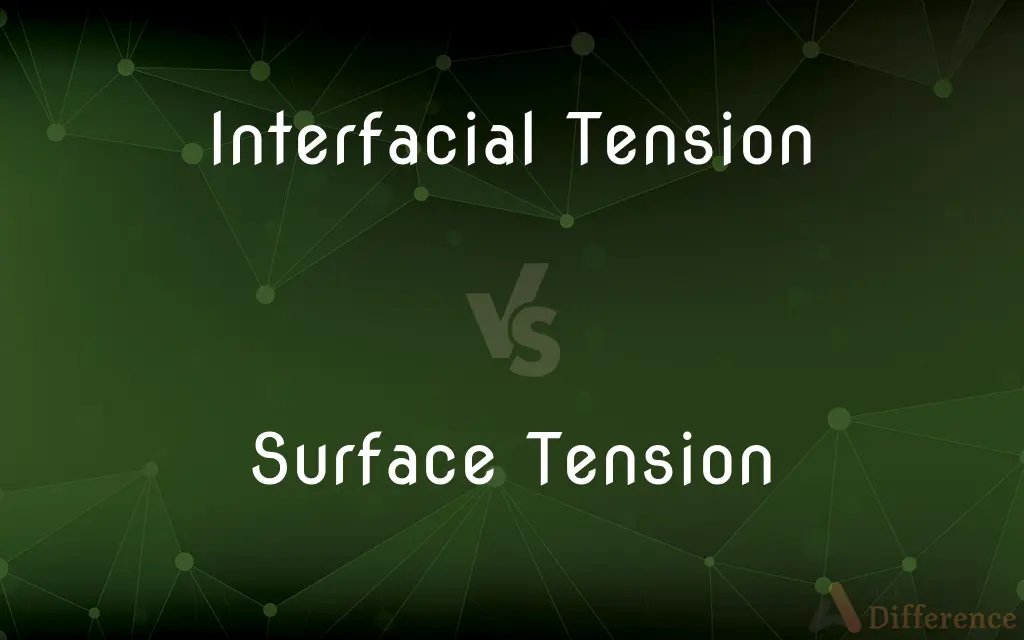Interfacial Tension vs. Surface Tension — What's the Difference?
By Tayyaba Rehman — Published on January 23, 2024
Interfacial Tension is a force per unit length existing at the interface between two different phases. Surface Tension is a force per unit length existing at the surface of a liquid due to unbalanced molecular cohesive forces.

Difference Between Interfacial Tension and Surface Tension
Table of Contents
ADVERTISEMENT
Key Differences
Interfacial tension refers to the force acting along the interface separating two immiscible liquids or a liquid and a gas. Surface tension, however, is specific to the surface of a liquid, describing the cohesive force exerted by molecules below the surface towards the interior.
Interfacial tension measures the extent of interaction (or lack thereof) between two different phases, such as oil and water. Surface tension is an indicator of the elastic tendency of a liquid surface and is observed in phenomena like water droplets forming a spherical shape.
The forces in interfacial tension involve different molecules of different substances, while surface tension involves similar molecules of the same substance. This distinction affects the applications and implications of each.
Interfacial tension is crucial in processes like emulsification and affects the behavior of mixtures. Surface tension influences capillary action and is a key factor in phenomena like the rise of water in a thin tube.
Both interfacial and surface tension have significant roles in various scientific and industrial processes, but their specific influences and measurements differ based on the interactions and phases involved.
ADVERTISEMENT
Comparison Chart
Definition
Force at the interface between two different phases
Force at the surface of a liquid
Interactions
Involves different molecules of different substances
Involves similar molecules of the same substance
Applications
Important in emulsification, detergents
Crucial in capillary action, formation of drops
Measurement
Measured between two phases
Measured at liquid-air interface
Phenomena Affected
Affects mixtures, separation processes
Affects wetting, spreading, and capillary action
Compare with Definitions
Interfacial Tension
Determines how two different substances interact.
Interfacial tension plays a role in the efficiency of oil recovery processes.
Surface Tension
Essential in phenomena like capillary action.
Surface tension causes water to climb up a thin tube against gravity.
Interfacial Tension
The force exerted at the boundary between two immiscible phases.
The interfacial tension between oil and water prevents them from mixing.
Surface Tension
Affects wetting and spreading of liquids.
Paint spreads evenly due to its surface tension properties.
Interfacial Tension
Influences the shape and stability of interfaces.
In emulsions, the interfacial tension affects the droplet size.
Surface Tension
Influences the liquid’s capacity to resist external forces.
Surface tension is why a carefully placed needle floats on water.
Interfacial Tension
Key in processes like emulsification and separation.
Lowering interfacial tension is crucial in making stable emulsions.
Surface Tension
A measure of the cohesive force at the liquid's surface.
The high surface tension of water forms droplets on leaves.
Interfacial Tension
A measure of the energy required to change the interface area between two phases.
Detergents lower the interfacial tension between oil and water, facilitating cleaning.
Surface Tension
The force that causes the surface of a liquid to contract.
Surface tension allows water striders to walk on water.
Common Curiosities
What role does interfacial tension play in oil recovery?
It affects the ease with which oil can be separated and recovered from other substances.
Why is interfacial tension important in detergents?
It reduces the tension between water and oils, improving cleaning efficiency.
How does surface tension affect capillary action?
It allows liquids to climb up narrow spaces against gravity.
How does temperature affect surface tension?
Generally, surface tension decreases with increasing temperature.
Are interfacial tension and surface tension related to viscosity?
They are separate phenomena, but both can influence how liquids flow and interact.
What is a common method to measure surface tension?
The droplet method or Wilhelmy plate method are commonly used.
Is interfacial tension only relevant in liquids?
Primarily, though it can also apply to interactions between gases and solids or liquids.
Does adding surfactants affect interfacial tension?
Yes, surfactants can significantly reduce interfacial tension, aiding in processes like emulsification.
How do detergents affect surface tension of water?
Detergents lower the surface tension of water, making it easier for water to spread and penetrate surfaces.
Can surface tension be altered?
Yes, adding substances like soap can lower a liquid's surface tension.
Why do some insects walk on water?
They exploit the high surface tension of water to support their weight.
What happens to surface tension when impurities are present in water?
Impurities can either increase or decrease surface tension, depending on their nature and concentration.
Can surface tension be observed in all liquids?
Yes, all liquids exhibit surface tension, but the degree varies based on their molecular composition.
Is interfacial tension relevant in biological systems?
Yes, it's important in biological processes like cell membrane formation and function.
Why is understanding interfacial tension important in industrial processes?
It's crucial for optimizing processes like separation, mixing, and chemical reactions involving different phases.
Share Your Discovery

Previous Comparison
Akbar vs. Ashoka
Next Comparison
WD My Book vs. WD Easy StoreAuthor Spotlight
Written by
Tayyaba RehmanTayyaba Rehman is a distinguished writer, currently serving as a primary contributor to askdifference.com. As a researcher in semantics and etymology, Tayyaba's passion for the complexity of languages and their distinctions has found a perfect home on the platform. Tayyaba delves into the intricacies of language, distinguishing between commonly confused words and phrases, thereby providing clarity for readers worldwide.
















































